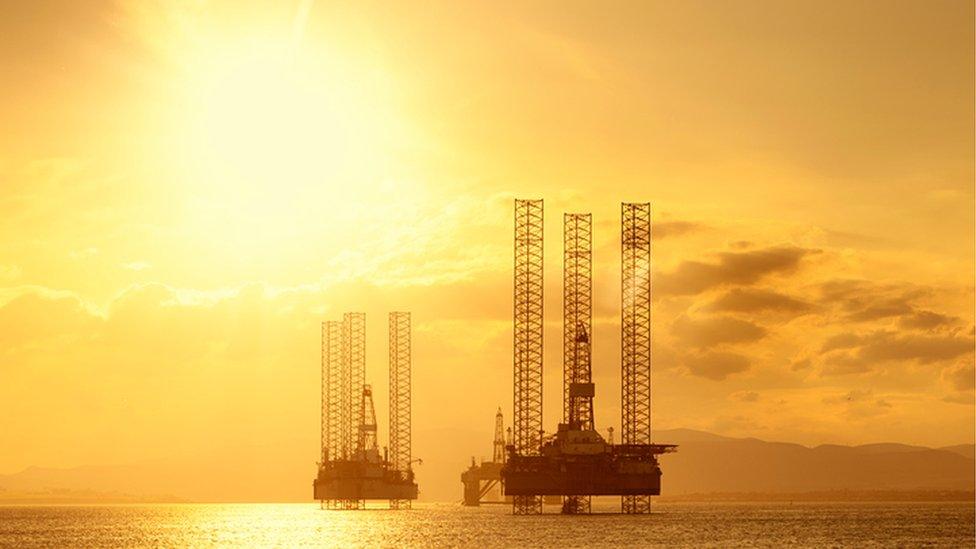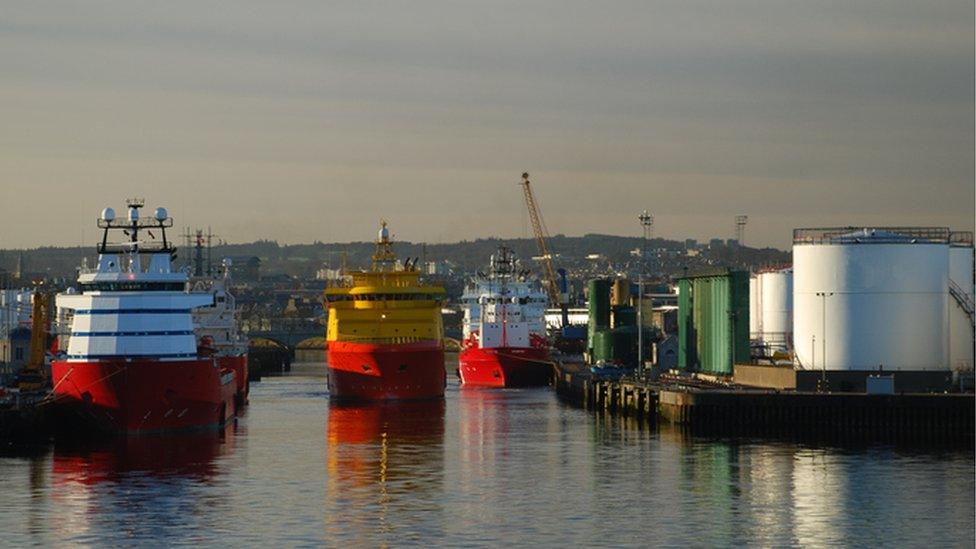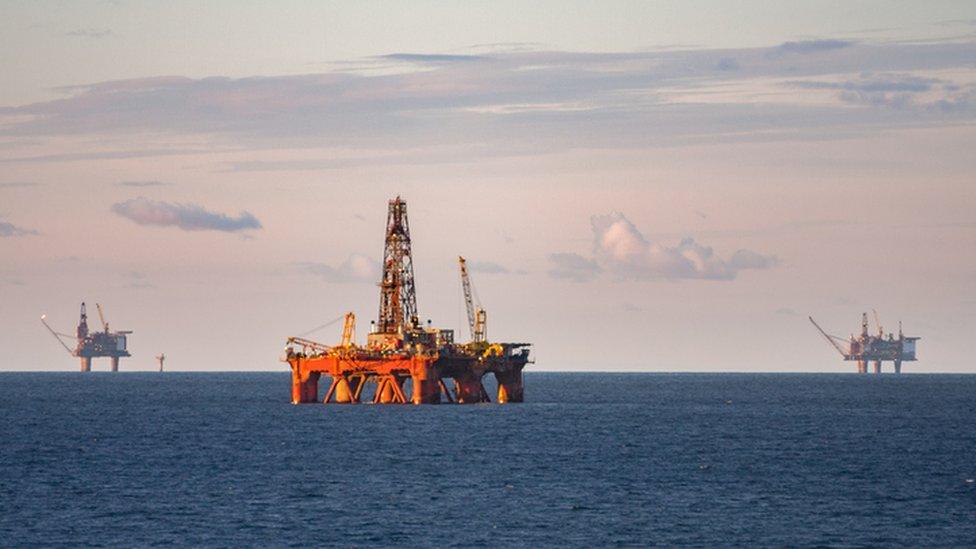Indyref and oil: going with the flow
- Published

For the oil industry, the good news is that the price has been relatively stable for more than three months. Not so good is the trending down towards $50 per barrel in recent days. The OPEC cartel agreement to rein back production, struck in November, has been looking shoogly of late.
Judging by the public pronouncements of industry majors in recent months, a corner may have been turned. Most companies - 99 out of 119 - expect to increase their capital spending this year, after slashing it in the past two years.
The biggest companies are more cautious, according to energy analyst Wood Mackenzie, but the aggregate increase in declared intentions to invest is 11%.
Prominent amid the plans is US drilling. Less so, offshore.
With a Scottish independence debate back in the springtime air, the state of the UK oil sector returns to get particularly close scrutiny. It's part of the wider economic debate I outlined a few days back.
What's known is that the UK oil and gas tax revenue has plummeted in recent years, from more than £10bn per year over several years, to being negative now.
Amid challenge to unhelpful statistics on this side of the Atlantic and in Washington, that much is a verifiable fact.
For an understanding of what comes next, it is necessary to go to experts making educated estimates. They gather information at a level of detail which is kept by oil producing firms from the public eye and from each other.
Depleted
Wood Mackenzie is one such collector and purveyor of data. Based in Edinburgh, as well as Houston and Singapore, the energy consultancy has run the numbers on the UK oil industry, and given an update on what reserves look like.
One very obvious source of change is that production since the last referendum has depleted reserves. The industry would like to replace those reserves with new discoveries.
But while pumping of oil and gas has removed 1.6 billion barrels (or gas equivalent) between 2014 and 2016, only 100 million barrels of commercially viable reserves have been identified. In other words, for every 16 barrels produced, only one barrel discovered.
The calculations change as the price does, in that the oil price moves reserves in and out of being financially viable. And with a low price fuelling a very low level of exploration, undiscovered reserves are more likely to remain undiscovered.
So, remember the 23 billion barrels of oil, often cited as the potential for Scotland if it became independent? How could you forget? That was the top end of a very widely ranging estimate.
The notion that it translated into £1.5 trillion worth of value was a big leap of the imagination. It depended on a high oil price, and ignored the role of oil producers in having to spend a lot to extract hydrocarbons from the seabed, while taking much of the profit out of Scotland once they do so.
This time, Wood Mackenzie provides some more sobering numbers, which chime with the recent report from Oil and Gas UK trade body.
Undiscovered
The big number remains big, even at half the oil price, with a pre-tax value placed on the remaining reserves at £44bn. It is reckoned that known reserves fell by more than quarter between 2014 and 2016, to six billion barrels. In addition to production depleting reserves, that is explained by some reserves moving into the contingent category - contingent, that is, on the price going up, and costs being kept under control.
Prospective resources are those that have yet to be found, so the estimate is particularly unreliable. With low exploration, that estimate has fallen 59% to 1.5 billion barrels, according to Wood Mac.

Some 88% of remaining reserves are reckoned to be in Scottish waters. Most of the prospective resources - 1.3 billion barrels - are thought to be in Scottish waters.
UK oil and gas production has risen in those two years by 25%. That rise follows on high levels of capital expenditure in recent years. The Edinburgh-based analysts reckon that has already fallen 45%, while the number of exploration and appraisal wells has declined by 44% during last year, to only 22.
"Political uncertainty"
"The outlook is not encouraging," Wood Mac reports. "We expect investment to continue to trend downwards, given capital expenditure has fallen by two-thirds since 2014. We anticipate it will halved from its current level in the next three years."
And then it gets controversial: "Critically, political uncertainty could deter investors from committing to new products. There is a risk that time-critical field developments become uneconomic if delayed in the short term."
Some will focus on the word "could". Again, we don't know. But between Brexit and the prospect of another independence referendum, that's where the business logic lies. And unlike other industries, which can pick up pace after a slowdown, the time-critical element of the North Sea is the need either to use equipment for more development, or to lose it permanently.
The argument is that political uncertainty can delay business decisions, which in turn can easily shift from delays to permanent loss of opportunities. And with a mid-range of estimates at 11 billion barrels - less than half the maximum figure much used and abused in the 2014 referendum campaign - there are still lots of those opportunities.
Scrap dividend
But that brings us to decommissioning. That is an economic opportunity for those who can win the work. But it comes at quite a cost to the government, in tax revenue foregone by giving tax breaks to the companies engaged in removing platforms and pipelines.
Wood Mac points out that the industry will expect an independent Scottish government to honour the commitments to tax relief on decommissioning. It doesn't quite spell out that a failure to do so would mean investment drying up at the exploration and production end of things.

According to new figures published on Monday, that cost, it seems, would fall on Holyrood at a growing pace over the next few years. At present, a lot of decommissioning effort is in the relatively old, small gas platforms of the southern North Sea. This year, the Scottish share looks like 70% of the total, falling to 66% of the £1.7bn spend next year.
But as the decommissioning process speeds up to as much as £2.3bn per year, and affects more northerly fields, the Scottish share is forecast by Wood Mac to rise as high as 90% in 2024. Over the decades, it might come to 80% of the total £52bn spend.
That's a lot of scrap metal, a lot of business, a lot of tax relief - and almost certainly a battle over the responsibilities of the Treasury in London, which has taken the revenue through the North Sea's boom years, and a future independent finance secretary in Edinburgh, for whom not much revenue beckons.